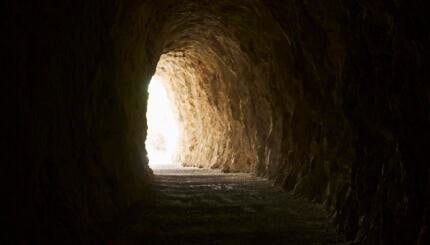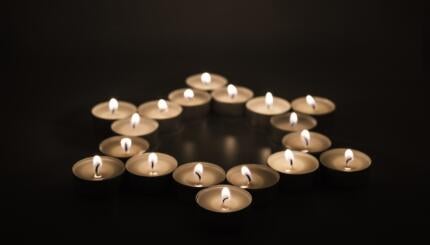As the secular calendar begins a new year, many American Jews are feeling a familiar sensation: tsuris. Maybe shpilkes too. We’re nervous, we’re troubled and we don’t know what the new year will bring.
Indeed, the sense of tsuris may be the one thing that unites Jews across the American and Israeli political spectra. We may disagree bitterly, we may be focused on antisemitism or the incoming president or Gaza or the hostages, we may accuse one another of all sorts of terrible things — but we’re all feeling anxious.
As with most things, Jewish tradition has an ambivalent relationship with uncertainty.
On the one hand, there are plenty of sources that provide what scholars say religion is supposed to provide: certainty, meaning and consolation. The doom-drenched hymns of Yom Kippur aren’t exactly cheerful, but they do promise that God has a plan for everything — even for you personally — and that plan is based in Divine knowledge and wisdom. Bad things happen, good things happen, but they all happen for a reason.
With your help, My Jewish Learning can provide endless opportunities for learning, connection and discovery.
Likewise God’s promises in the Torah. If you obey, the rain will fall and the crops will be plentiful. If you don’t, you’ll have tsuris.
On the other hand, most contemporary Jews don’t think this way anymore. When Jews hear that everything happens according to God’s will, many of us are, well, repulsed. This is what philosophers mean when they say God died in Auschwitz — not that the deity physically perished, of course, but that traditional Jewish theodicy no longer works. After unspeakable evil, claiming that it was all God’s will provides the very opposite of comfort. (Zachary Braiterman’s book (God) After Auschwitz discusses many of these thinkers.)
And it’s not only the Holocaust. Traditional theodicy seems equally unable to account for children with cancer or people dying in natural disasters. Intellectually, it’s possible to square the circle, and many theologians have done so. But emotionally and spiritually, this conception of the puppetmaster god has come to feel offensive.
And, of course, we have Larry David, Woody Allen and Linda Richman on Saturday Night Live. To be a Jew is to fret. And can you blame us?
I want to suggest that there is a third position that is neither a Candide-like trust that everything is gam zu l’tovah (“this, too, is for the good”), nor a Curb Your Enthusiasm-like agita. And that third position comes, I think, from translating the theologies of the past into the worldviews that most of us hold in the present.
What do we know? We know that uncertainty is an essential, unavoidable part of life. I’ve found this simple statement to be of profound comfort in these last few months. Because as difficult as living with uncertainty is, it’s made more difficult by thinking life shouldn’t be this way. We tell ourselves that life shouldn’t be so unpredictable or chaotic — that things should be orderly and sane.
But they never have been. Sure, our times are unique in some ways — the climate crisis, AI, technology in general — but in other ways they are not. There have always been powerful people preying on the less powerful. There have always been some leaders who tell the truth and some leaders who don’t. Sickness, old age and death have always been facts of life, and none of us knows when they will come for us. Most of what really matters in our lives is beyond our control. Uncertainty is not a bug in the system of life. It’s a feature of it.
Our human responses to uncertainty are also quite natural. When Moses sends spies to scout the Promised Land (here’s a much younger me telling that story on YouTube!), most of them come back full of uncertainty and fear. “The inhabitants of the land are like giants,” we can hear them screeching. “We’re all going to die!” This is human nature.
My longtime friend and teacher Rabbi Jacob Staub once advised me (drawing from twelve-step teachings) to do my best and then “leave the rest to God.” He didn’t mean this theologically; he meant that whatever is beyond my control, I should recognize as being beyond my control. Whether I think there’s an anthropomorphic God at the wheel or not, I can at least know that, in most of the ways that count, I’m not.
From this negative-theological position, I find myself able to re-embrace lines like the one that Jews say each week at the end of the Shabbat: Hinei el Yeshuati, eftach v’lo efchad — behold, God is my salvation, I will trust and not fear. I don’t truly think God always provides salvation. Many good people are not saved, at least not in this world. But I can still cultivate an attitude of trust amid uncertainty.
I may use different techniques to work with anxiety than my ancestors did, like meditation or breathing exercises, or even a science-informed reflection on humankind’s place in the cosmos. But the basic move is the same: trust instead of fear. I don’t know what will happen next year to the world, to the country, or to me. In this moment, though, I can put down these worrisome burdens (with a little work, anyway) because they’re really not mine to carry in the first place.
Uncertainty, and the anxiety that comes with it, are a part of life; they’re not here by mistake. And so, without making any theological claims, I do my best and leave the rest to God.



